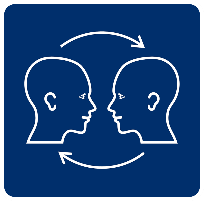- What types of AAC assessments are there and how can I access them?
A number of specialist centres throughout the UK offer specialist AAC assessments. These centres offer a personalised, detailed assessment of need. Access to these centres varies depending on which country you are in due to the difference in funding. All of the centres offer specific information on how to complete a referral for assessment. In England local services are also responsible for assessing and providing AAC assessment, usually through the relevant local speech and language therapy service.
Contact each centre directly for the most up-to-date referral processes and procedures.
- Who might assess my communication needs and what is their specific role?
Specialist assessment centres have a team of professionals who collaborate on the assessment. These might include speech and language therapists, teachers, occupational therapists and clinical scientists/assistive technologists. How great a role any of these may play in your assessment will depend on your particular needs.
Locally, you may find a speech and language therapist completes an initial assessment of your communication needs. This person may have the relevant AAC knowledge, or they may recommend referral to a specialist centre for a more in-depth assessment dependent on the assessed needs.
- What is a care pathway?
Within the NHS, a care pathway outlines the typical route for managing a person with a specific condition. It is based on multidisciplinary working, beginning with a person’s first point of contact with the health services. The pathway covers referral to specialists, their treatments and outlines anticipated timeframes for these actions.
The care pathway:
- recommends which professionals a person should see for treatment
- documents the interventions and care that a patient should receive
- targets timeframes for completion of activities
Based on the care pathway individuals will usually have a care plan created based on their needs.
- What is an Education, Health and Care Plan (EHCP)?
An EHCP is for children and young people aged up to 25 who need more support than is available through special educational needs support. EHCPs identify educational, health and social needs and set out the additional support to meet those needs.
The EHCP is a legally binding document issued by local authorities in England and Wales. The EHCP should detail extra resources including staff time, specialist assessments, equipment required and costs, and should also list health and care needs. The EHCP is reviewed every year. As a parent, you can disagree with the EHCP and request an appeal.
The government website has information on the EHCP process.
- What support is there in Scotland for children with special educational needs?
In Scotland, the term “additional learning needs” refers to all learning support needs. It encompasses the needs of all children, including, for example, disabled children, children in care, refugees, gifted children, children with English as an additional language, bullied children, bereaved children and children who are parents. The education authority can issue a “co-ordinated support plan” for a child or young person with complex and multiple factors that affect their education. The plan is to co-ordinate support from various agencies such as education, health and social services. It is a legally binding document. A variety of other plans for pupils exist, including individualised educational programmes and personal learning plans.
The Scottish Executive has published a guide to additional support for learning (PDF) and a handout on the Additional Learning Support Act (PDF), which explains the legislation. The Scottish charity Enquire has published a factsheet on Co-ordinated Support Plans (PDF) and operates a helpline on 0845 123 2303.
- How do I access speech and language therapy?
Usually the first point of contact for speech and language therapy in England and Wales is your GP, as recommended by the Royal College of Speech and Language Therapists. However, most services will accept referral from other healthcare professionals and usually will accept self-referrals. To self-refer, contact your local NHS service and ask for the phone number of the relevant speech and language therapy service. The Talking Point website provides a list of speech and language therapy services, and has a page where you can find your local service.
You can also choose to have a private service – you can search for therapists near you on the Association of Speech and Language Therapists in Independent Practice website.
- What does clinical decision-making actually mean?
This refers to how professionals reach a set of recommendations that would best support individual communication needs. The process includes consulting with the person who needs language support and their family. An AAC decision-making process should also include a range of technologies that support communication, such as mounting systems, access systems and intervention support structures.
See also
- FAQs – AAC and Autism Spectrum Disorder (ASD)
- FAQs – AAC and cerebral palsy (CP)
- FAQs – AAC and developmental difficulties
- FAQs – AAC and employment
- FAQs – AAC and general paediatric care
- FAQs – AAC and hospitalisation
- FAQs – AAC and locked-in syndrome
- FAQs – AAC and Parkinson’s Disease (PD)
- FAQs – AAC and stroke and aphasia
- FAQs – AAC and training
- FAQs – AAC assessment and clinical decision-making
- FAQs – the law, policy and services






